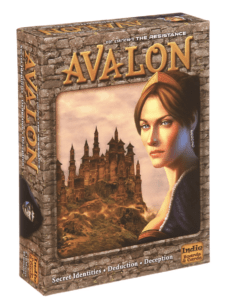 Avalon is a social deduction game set in the mythical land of Camelot. It is created by Don Eskridge and I played the physical board and card game platform. The game revolves around the conflict between the forces of good, represented by the loyal knights of King Arthur, and the forces of evil, represented by the minions of the sorceress Morgana. The game uses a combination of deduction, bluffing, and teamwork to create a fun and engaging experience for players. The game’s theme is set in the medieval world of Camelot and features characters and elements from Arthurian legend.The theme is reinforced through its graphic design decisions, with artwork and illustrations that evoke the medieval setting of Camelot. The use of color and iconography also helps to differentiate between player roles and the various quest stages.
Avalon is a social deduction game set in the mythical land of Camelot. It is created by Don Eskridge and I played the physical board and card game platform. The game revolves around the conflict between the forces of good, represented by the loyal knights of King Arthur, and the forces of evil, represented by the minions of the sorceress Morgana. The game uses a combination of deduction, bluffing, and teamwork to create a fun and engaging experience for players. The game’s theme is set in the medieval world of Camelot and features characters and elements from Arthurian legend.The theme is reinforced through its graphic design decisions, with artwork and illustrations that evoke the medieval setting of Camelot. The use of color and iconography also helps to differentiate between player roles and the various quest stages.
The game uses a combination of deduction, bluffing, and teamwork as a core dynamic. Players are assigned hidden roles at the start of the game, and must work together to complete quests while trying to uncover the traitors among them. These roles and quests are set mechanics. This creates an element of mystery and intrigue for players that works towards an aesthetic of Fantasy, Narrative, and Fellowship.
One way Avalon differentiates itself from other games in its genre is through its focus on teamwork and communication. Unlike other social deduction games such as werewolf and mafia where players are primarily working to uncover hidden roles, Avalon requires players to work together to build teams and complete quests. Opponents (or bad guys) aren’t simply outed in a round, but the mechanics make it so that players must deduce opponents and work to prevent their opponents from sabotaging them. This creates a greater emphasis on player interactions and encourages more open communication between players. One might then compare this game to Secret Hitler, both games have a voting system and the quest/mission dynamic operates from the same mechanics in the games. Both games also add in larger game variability, but where Secret Hitler adds variability in changing game mechanics as it goes on (rules change once Fascists pass a certain amount of laws), Avalon resembles werewolf in adding player role variability.
In terms of handling abuse, Avalon provides guidelines for players to follow in order to create a safe and respectful gaming environment. However, as with any social game, it is ultimately up to the players themselves to maintain a positive and respectful atmosphere.
To make the game even better, one possible improvement would be to add more variation to the quest objectives, similar to what is done in Secret Hitler. This would help to keep the gameplay fresh and exciting over multiple playthroughs. Additionally, finding ways to add game player variability in small numbered playthroughs would add more delight. I played Avalon in a 5 person game, which meant that there was fewer variability amongst good cards and bad cards.
Overall, Avalon is a well-designed social deduction game that combines engaging mechanics with an immersive medieval theme to create a fun and memorable gaming experience.




